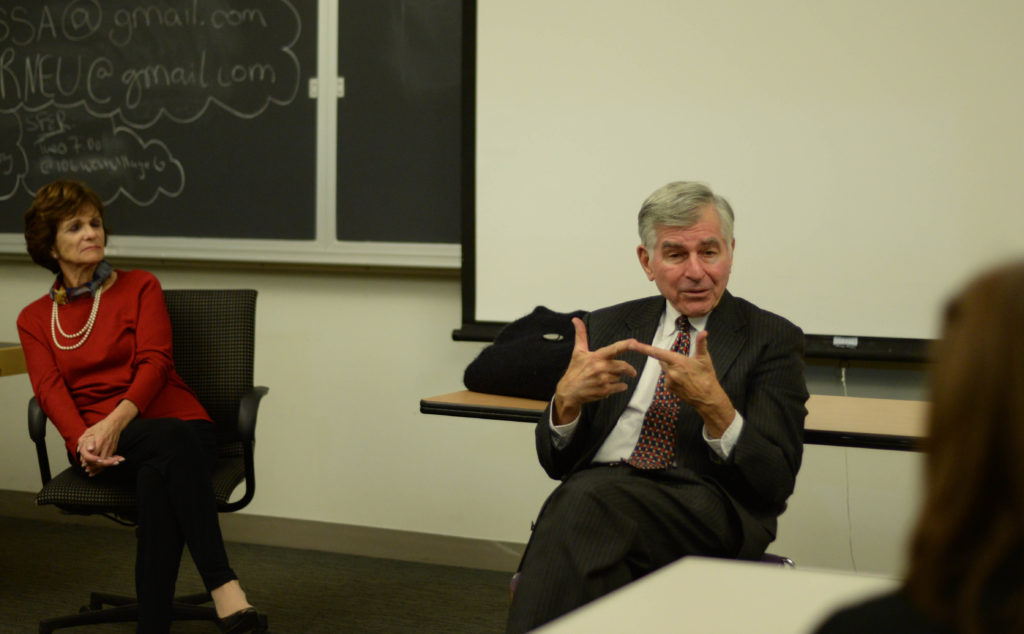By Scotty Schenck, news correspondent
On the night of Nov. 18, a former governor walked through the doors of West Village. He entered a room full of like-minded, politically engaged individuals. Professor and former Massachusetts Gov. Michael Dukakis had one thing this year that he doesn’t always at his yearly address to Northeastern University College Democrats (NUCD), a cast from a recent medical problem. Once he finished explaining the minor health issue that forced him to limp into the room, Dukakis began to talk politics.
“Election day was not a great day… I’d say that’s probably the understatement,” Dukakis said. “I think it’s a good time to think about why it happens.”
As far as local elections, Dukakis said that late primaries in Massachusetts often contribute to Republicans winning the gubernatorial races, and cited fellow Gov. Mitt Romney’s campaign as a prime example. He said that Democrats spend so much money winning primaries that afterwards, they have little to no money to help defeat their opponents.
Nationally, he offered a solution to the Democrats’ troubles of maintaining control of Congress, pointing to the lowest link in the chain: individual voter precincts.
“It hadn’t been for [her] precinct-based grassroots organization, Elizabeth Warren, she would’ve lost,” Dukakis said.
Dukakis said that grassroots organizations are able to have the face-to-face communication that is necessary to win an election at any level, and he’s not the only one who agrees with this philosophy. Junior political science major and President of the College Democrats of Massachusetts Marvin McMoore said he has seen Dukakis speak a number of times at NUCD meetings, and he agrees with the message.
“Whether it be with our roommate or that grumpy uncle or knocking on doors in our community, that’s what really gives us that leading edge on election day,” McMoore said of grassroots campaigning.
Dukakis said the Democrats are using political consultants who try to win elections by piecing together smaller portions of different voter demographics, rather than trying to create broad appeal to a majority of voters.
“I don’t want to be too tough on political consultants… I really think they don’t understand what kind of a message we have to be delivering to the American people if we’re going to get back on track and become a majority party again,” Dukakis said.
Grassroots organization and elections weren’t the only things on Dukakis’ mind. He also gave advice on balancing a family and political career, citing his wife, Katharine “Kitty”, a distinguished political science professor at Northeastern, and three children.
“No matter what you’re doing, make time for yourselves and the people you’re close to,” Dukakis said. “It may be the exception, but for us it was absolutely important.”
He also went on to discuss his wife’s role in his earlier campaigns before they were married in 1963.
“In my first race for the legislature, Brookline in 1962, Kitty stood in front of a polling place at Saint Mary’s Roman Catholic Church in Brookline Village for 13 hours campaigning,” he said. “And when I came out of there with a decisive majority, she was obviously the girl for me.”
Talking about politics and personal life struck a chord with some students at the meeting. Freshman history major John Lovett said that it was a topic he had been wondering about for a while.
“[Dukakis] found time to have his personal life while being a real public servant who cared about his people,” Lovett said.
Making time wasn’t the only rule Dukakis set for himself. He said he and Kitty decided on two basic rules: that he would be home for dinner at 6 p.m., and while his wife was teaching dance classes on Tuesday and Thursday nights, he would stay home with the kids. In addition, Dukakis said he always took Sundays off from work, with few exceptions.
“Don’t let anybody tell you you can’t succeed in politics without working seven days a week,” Dukakis said, adding that he thought he did not work every day, he and his staff worked hard to make up for it.
Junior political science major and president of NUCD Shakeir Gregory said that the meeting went well. Gregory said there is “something” about Dukakis that draws people to him.
“I was looking around, it happens every year; they love him,” Gregory said. “He’s great at taking complex issues… and explaining it in an accessible way.”
Photo by Scotty Schenck









